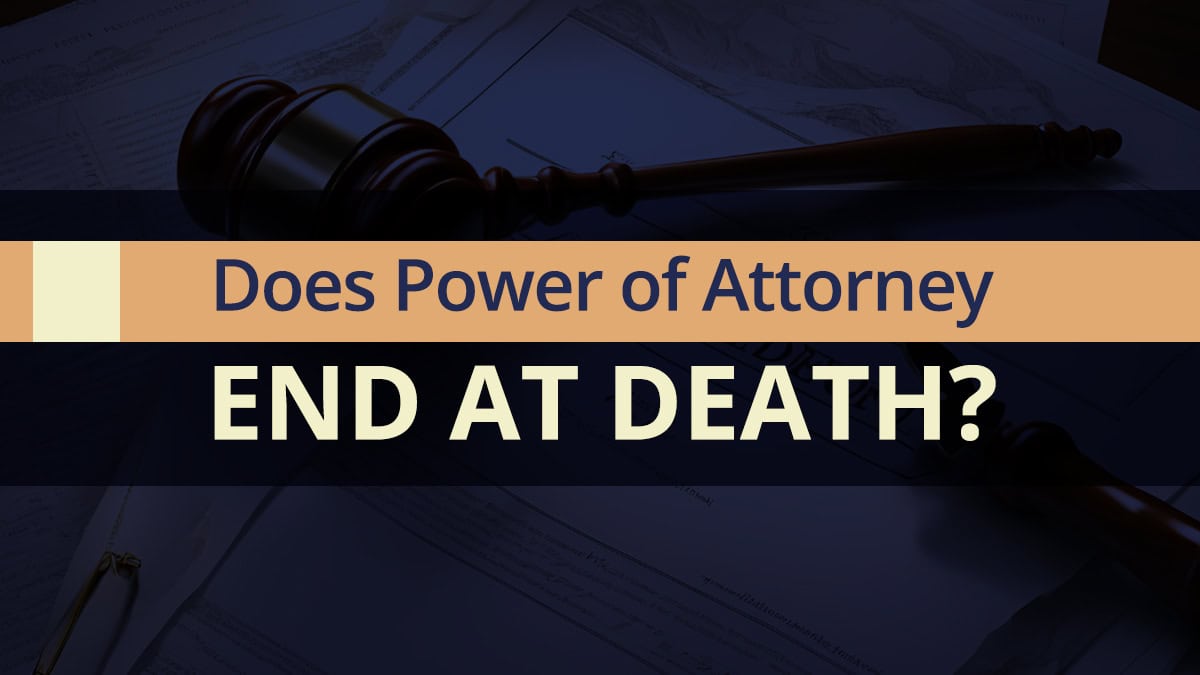When someone gives you Power of Attorney, you have the legal authority to act on their behalf. But what happens when that person passes away? Does power of attorney end at death? Many people assume the power continues, but that’s not the case.
Power of Attorney ends the moment the person who granted it dies. At that point, any authority you had to make decisions for them disappears.
If you’re handling their affairs, you might be wondering what to do next. Understanding how this works can help you avoid legal trouble and take the right steps moving forward.
After the POA Legal Document Ends: What Happens Next?
When a Power of Attorney (POA) ends in North Carolina, many people find themselves unsure of what steps to take. The attorney in fact no longer has any legal authority, and the responsibility for handling the deceased’s estate shifts to others.
Understanding the legal process can help you avoid mistakes and ensure the principal’s affairs are handled properly.
Who Takes Over When Power of Attorney Ends?
Once the principal dies, the agent’s authority ends immediately. The POA document no longer has any effect, even if it was a durable power or granted broad powers over the principal’s assets. Instead, the following individuals or entities may take over:
- The executor named in the principal’s will
- A personal representative appointed by the probate court
- An estate administrator (if no will exists)
If you were acting under Power of Attorney, you no longer have access to bank accounts, the ability to make financial transactions, or the right to manage the principal’s affairs.

What Happens to the Principal’s Assets?
The deceased’s estate goes through the probate process, unless assets were placed in a trust or transferred through comprehensive estate planning. In North Carolina, the probate court oversees:
- Estate administration to ensure debts, taxes, and expenses are paid
- Estate management, including the transfer of assets to heirs
- Selling property if needed to settle debts or distribute assets
If the principal’s wishes were outlined in a will, the executor named follows those instructions under state law. Without a will, the court distributes the estate according to North Carolina intestacy laws.
Can You Still Access the Principal’s Bank Accounts?
No. When the principal passes, all access granted by a financial POA or general POA ends. Financial institutions will freeze the accounts until an estate administrator or executor named presents a death certificate and court documents proving authority.
Attempting to use a POA document after the principal’s demise can have legal consequences, including potential criminal charges. This applies even if you were previously managing financial affairs under a durable power.
What About Business Operations?
If the principal’s assets included a business, the next steps depend on the legal structure:
- Sole Proprietorship – The business ceases unless transferred through estate planning.
- LLC or Corporation – Ownership transfers based on operating agreements or wills.
If you had authority for business operations through a general POA, that authority ends. The probate proceedings or succession planning documents will dictate who takes over.
What Are the Next Steps for the Agent?
If you served as the designated agent under the Power of Attorney, you should:
- Stop all decision-making related to the principal’s affairs.
- Notify financial institutions and relevant parties that the attorney terminates.
- Gather important documents, including the POA document, death certificate, and will.
- Assist the estate administrator in transitioning responsibilities.
If you are unsure of your legal responsibilities, consulting a law firm experienced in estate administration can prevent issues.

Does a Medical Power of Attorney Work After Death?
No. A medical power only applies during the principal’s lifetime. After death, decisions about end-of-life care, burial, or cremation follow the decedent’s wishes in their will or living wills.
Healthcare providers and family members must follow these instructions rather than the agent’s authority under a medical POA.
Avoiding Legal Issues After Power of Attorney Ends
The transition underscores the importance of planning. Acting beyond your authority could result in criminal charges or disputes with heirs. If you were handling financial power, healthcare decisions, or specific tasks, make sure to follow state law and step aside when required.
If you need help understanding probate proceedings, working with a law firm that handles estate management can help you navigate the next steps legally and effectively.
You shouldn’t have to navigate estate administration alone. Our team at Capital City Estate Planning is here to provide clear answers, trusted guidance, and efficient legal support.
Call Capital City Estate Planning at (984) 299-5160 or schedule your free consultation online.
How Does the Probate Process Work in North Carolina?
When a principal dies, their estate must go through probate proceedings to ensure assets are properly distributed. This legal process verifies the will, settles debts, and transfers property.
If you were handling affairs under a Power of Attorney, your role ends, and the court takes over.
Who Handles the Estate After the Principal’s Death?
The authority granted under a POA document does not continue once the principal dies. Instead, the court appoints someone to manage the estate. This person may be:
- The executor named in the will
- An estate administrator if there is no will
The executor or estate administrator is called the “personal representative” by the court. This person steps in to handle financial transactions, distribute the principal’s assets, and follow state law.
What Are the First Steps in Probate?
After the principal’s death, the executor or other family members must begin the probate process by:
- Filing a death certificate and the will with the clerk of court
- Submitting a petition to open probate proceedings
The personal representative then provides notice to heirs and creditors and works through the probate process with court oversight.
Without a will, the court follows North Carolina’s intestacy laws to decide who inherits the estate.
How Are Debts and Bills Handled?
The personal representative must settle outstanding debts before distributing assets. This includes:
- Paying bills such as utilities, mortgages, or loans
- Notifying creditors and allowing them time to file claims
- Selling property if needed to cover debts
If debts exceed assets, the estate may be insolvent, meaning creditors get paid first, and heirs receive nothing.
Can You Access the Principal’s Bank Accounts?
If you were the attorney under a General Power of Attorney, you no longer have authority to manage funds. Only the estate’s personal representative can access bank accounts after providing court-approved documents.
Any attempt to continue financial transactions under the POA document after the principal’s death can result in legal penalties.

What Happens to Medical and Healthcare Decisions?
A Medical Power of Attorney also ends when the principal dies. Any healthcare decisions you made while acting under this role are no longer valid. Instead:
- Healthcare providers follow the principal’s wishes outlined in advance directives
- End-of-life care choices are carried out according to a will or living will
- Family members take responsibility for funeral or burial arrangements
How Long Does Probate Take?
The length of probate depends on:
- Estate size – Larger estates take longer to settle
- Disputes among heirs – Will contests or disagreements can delay proceedings
- Unresolved debts – Creditors may challenge claims or seek additional payment
In North Carolina, probate proceedings generally take six months to a year, but complex cases can last longer.
Finalizing the Estate
Once debts are paid and all assets are distributed, the court closes the estate. The executor or estate administrator (personal representative) must:
- File a final accounting with the court
- Show proof that all distributions followed the law
- Request closure of the estate case
At this point, the fiduciary duty of the executor or estate administrator ends, and the probate process is complete.
Estate Administration is Complex. Are You Ready?
At Capital City Estate Planning, We Guide You Every Step of the Way
Handling a loved one’s estate can feel overwhelming. Legal requirements, financial responsibilities, and strict deadlines can quickly become too much to manage. At Capital City Estate Planning, we provide the support and expertise you need to navigate this process with confidence.
Simplified and Complex Estate Settlements
Every estate is different. Whether you qualify for a simplified estate settlement or need guidance through a complex estate, we ensure you meet all legal requirements while protecting the estate’s value. Our team helps:
- File petitions for simplified estate procedures
- Navigate probate for estates with significant assets or legal challenges
- Ensure compliance with North Carolina probate laws
Managing Creditors, Taxes, and Asset Distribution
Settling an estate involves more than just following a will. You must also:
- Handle creditor claims and ensure proper debt repayment
- Manage tax obligations to avoid unnecessary penalties
- Distribute assets fairly among heirs based on legal guidelines
We take care of these details so you can focus on what matters most.
Legal Filings and Documentation
Estate administration requires precise legal paperwork. Our firm prepares and submits all necessary documents, including:
- Court filings for probate proceedings
- Asset valuation reports to ensure accurate distributions
- Spousal allowance applications under North Carolina law
We handle these complexities so you don’t have to.
Get the Help You Need Today
You shouldn’t have to navigate estate administration alone. Our team is here to provide clear answers, trusted guidance, and efficient legal support.
Call Capital City Estate Planning at (984) 299-5160 to schedule your free consultation.

